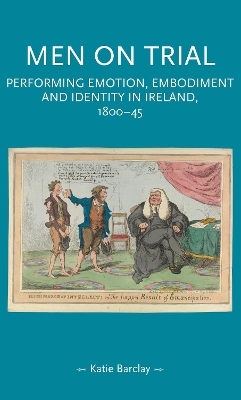
Men on Trial
Performing Emotion, Embodiment and Identity in Ireland, 1800–45
Seiten
2018
Manchester University Press (Verlag)
978-1-5261-3292-5 (ISBN)
Manchester University Press (Verlag)
978-1-5261-3292-5 (ISBN)
Men on Trial provides the first history of masculinity and the law in early nineteenth-century Ireland. It combines cutting-edge theories from the history of emotion, performativity and gender studies to argue for gender as a creative and productive force in determining legal and social power relationships. -- .
Men on trial explores how the Irish perform ‘the self’ within the early nineteenth-century courtroom and its implications for law, society and nation. Drawing on new methodologies from the history of emotion, as well as theories of performativity and performative space, it emphasises that manliness was not simply a cultural ideal, but something practised, felt and embodied. Men on trial explores how gender could be a creative dynamic in productions of power. Targeted at scholars in Irish history, law and gender studies, this book argues that justice was not simply determined through weighing evidence, but through weighing men, their bodies, behaviours, and emotions. Moreover, in a context where the processes of justice were publicised in the press for the nation and the world, manliness and its role in the creation of justice became implicated in the making of national identity. -- .
Men on trial explores how the Irish perform ‘the self’ within the early nineteenth-century courtroom and its implications for law, society and nation. Drawing on new methodologies from the history of emotion, as well as theories of performativity and performative space, it emphasises that manliness was not simply a cultural ideal, but something practised, felt and embodied. Men on trial explores how gender could be a creative dynamic in productions of power. Targeted at scholars in Irish history, law and gender studies, this book argues that justice was not simply determined through weighing evidence, but through weighing men, their bodies, behaviours, and emotions. Moreover, in a context where the processes of justice were publicised in the press for the nation and the world, manliness and its role in the creation of justice became implicated in the making of national identity. -- .
Katie Barclay is an Associate Professor in the ARC Centre for Excellence in the History of Emotions and Department of History, University of Adelaide -- .
Opening speeches: an introduction
1. Law and lawyers: ‘the prerogative of the wig’
2. The stage: ‘the court presented a very imposing spectacle’
3. Bodies in court: ‘Hogarth would have admired him forever’
4. Speech, sympathy and eloquence: ‘it is a voice full of manly melody’
5. The cross-examination: ‘he’s putting me in such a doldrum’
6. Storytelling: ‘quoting the poet’
7. On character: ‘you see McDonnell the value of a good character’
Closing arguments: a conclusion
Select Bibliography
Index -- .
| Erscheinungsdatum | 09.02.2019 |
|---|---|
| Reihe/Serie | Gender in History |
| Zusatzinfo | 14 black & white illustrations |
| Verlagsort | Manchester |
| Sprache | englisch |
| Maße | 138 x 216 mm |
| Gewicht | 503 g |
| Themenwelt | Geschichte ► Teilgebiete der Geschichte ► Kulturgeschichte |
| Recht / Steuern ► Allgemeines / Lexika | |
| Recht / Steuern ► EU / Internationales Recht | |
| Recht / Steuern ► Rechtsgeschichte | |
| Sozialwissenschaften ► Soziologie ► Gender Studies | |
| ISBN-10 | 1-5261-3292-3 / 1526132923 |
| ISBN-13 | 978-1-5261-3292-5 / 9781526132925 |
| Zustand | Neuware |
| Haben Sie eine Frage zum Produkt? |
Mehr entdecken
aus dem Bereich
aus dem Bereich
der stille Abschied vom bäuerlichen Leben in Deutschland
Buch | Hardcover (2023)
C.H.Beck (Verlag)
CHF 32,15
vom Mittelalter bis zur Gegenwart
Buch | Softcover (2024)
C.H.Beck (Verlag)
CHF 16,80
eine Geschichte der Welt in 99 Obsessionen
Buch | Hardcover (2023)
Klett-Cotta (Verlag)
CHF 34,90


